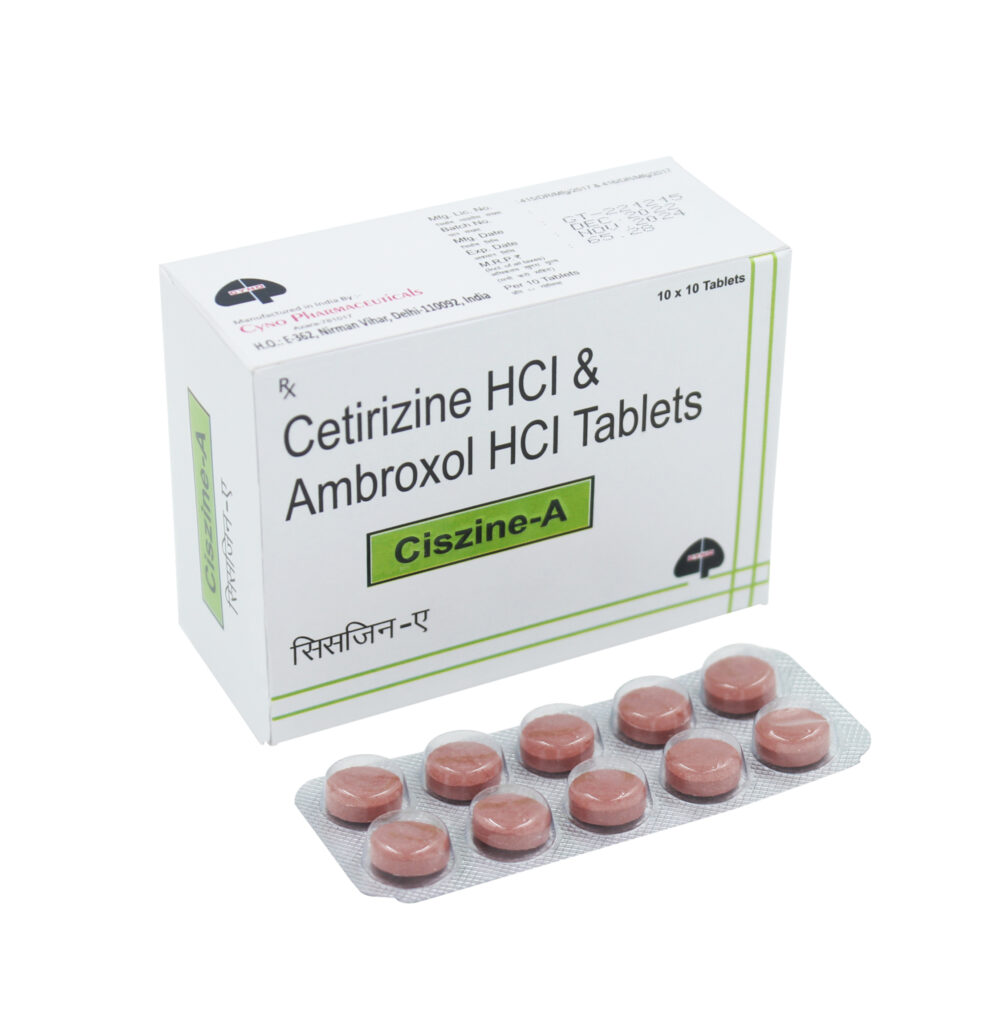
Mechanism of Action:
Ciszine-A (Cetirizine/Ambroxol) treats allergies by blocking histamine receptors and increasing the breakdown of mucus. It is produced by combining an antihistamine with a systemic mucolytic agent. Cetirizine is classified as second generation anti-histamine. It works by selectively inhibiting the H1 histamine receptors. By preventing histamine from acting on its receptors, this medicine helps to alleviate the symptoms caused by hay fever or other allergies (such as a runny nose and watery eyes). Ambroxol has secretolytic properties, and it works by reducing the viscosity (thickness) of mucus, allowing for more of it to be removed from the body.
Dosage and Administration:
Ciszine-A (Cetirizine/Ambroxol) tablets are film coated and contain 5mg of cetirizine and 60mg of ambroxol. Your physician will assess the seriousness of your symptoms when deciding on the correct dosage. After this, a dosage regimen suited to your individual needs can be determined. Always follow the dosage instructions given by your physician and do not take more than the recommended dosage as this can put your health and safety at risk.
Side effects:
Patients treating allergies or any other medical conditions with the medicine. Ciszine-A (Cetirizine/Ambroxol) may experience some side effects. Contact your physician if this happens. Some examples are listed here:
Although the occurrence of serious side effects is not considered to be common, patients still need to make themselves aware of the fact that this may occur in rare cases. Attend the emergency room or consult your physician straight away if you notice abnormally hyperactive behavior, shaking, visual disturbances or any other serious side effects that have not been listed here.
Pregnancy:
Contraindicated; since Cetrizine and Ambroxol are contraindicated in pregnancy; the combination generic are contraindicated in pregnancy.
Breast Feeding:
Contraindicated; since Cetrizine and Ambroxol are contraindicated in breast feeding; the combination generic are contraindicated in breast feeding mother.
Warnings and Precautions:
1. If you have an allergic or hypersensitive reaction, seek emergency medical attention.
2. Possible symptoms include difficulty breathing, difficulty swallowing, swelling, chest tightness, skin rashes, and hives.
3. This medication should only be used as instructed and prescribed by your physician or pharmacist. Do not alter your dosage unless specifically instructed to do so by either of the above.
4. Dosage and usage often depends on the severity of the condition, as well as the patient’s medical history and current health condition.
5. Before you begin using this medication, ensure your physician is aware of the following:
Information on this website is for general awareness only and not a substitute for professional medical advice, diagnosis, or treatment. Always consult a qualified doctor before using any product or taking any medical action.
Cyno and its affiliates make no warranties—express or implied—regarding the accuracy or completeness of the information provided. Use of this website and reliance on its content is at your own risk. Cyno shall not be liable for any loss or damage arising from such use. Content may be updated or changed without notice.
WhatsApp us